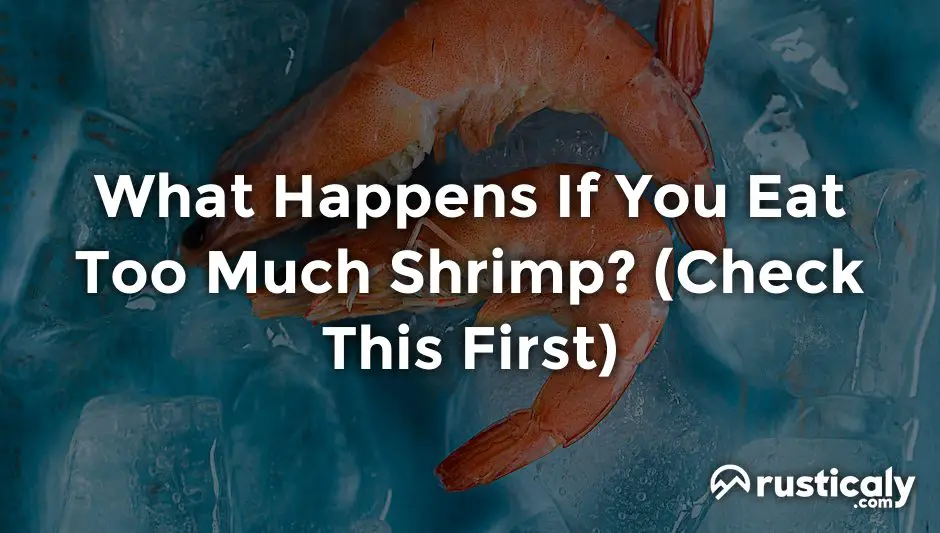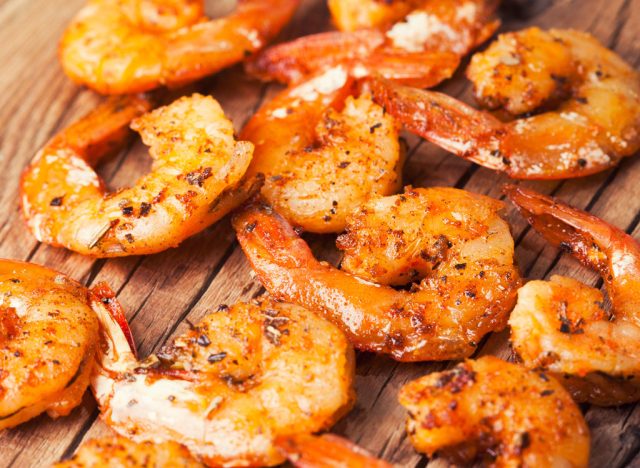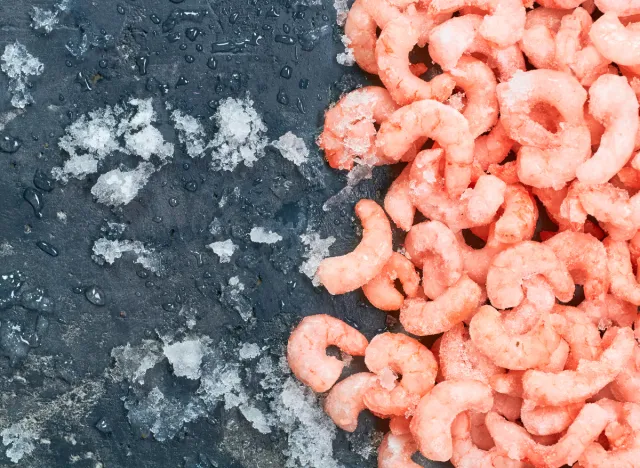Look, I get it – shrimp is absolutely delicious! Whether it’s grilled, fried, or tossed in pasta, these little crustaceans are hard to resist. But you might be wondering if there’s such a thing as eating too much shrimp. Well, I’ve done the research and I’m here to break down everything you need to know about shrimp consumption and its effects on your health.
Quick Answer
While shrimp is generally safe and nutritious eating more than 300 grams (about 15 jumbo shrimp) per day can increase risks of high cholesterol blood pressure issues, and other health concerns. The key is moderation – stick to 2-3 servings (8-12 ounces) of shrimp per week for optimal benefits.
How Much Shrimp is Too Much?
Here’s a simple breakdown of recommended shrimp portions by age group
For Kids:
- Ages 1-3: 1 ounce (3 medium shrimp)
- Ages 4-7: 2 ounces (6 medium shrimp)
- Ages 8-10: 3 ounces
- Ages 11+: 4 ounces
For Adults:
- Regular serving: 4 ounces (about 8 medium shrimp)
- Maximum daily amount: 300 grams
- Weekly recommendation: 2-3 servings (8-12 ounces)
For Pregnant Women
- Per serving: 4 ounces
- Weekly limit: 2-3 servings
The Good Stuff: Benefits of Eating Shrimp
Before we get to the scary stuff, let’s look at why shrimp is actually pretty awesome for your health:
Nutritional Profile (per 100g)
- Calories: 99
- Protein: 24g (48% DV)
- Selenium: 69% DV
- Vitamin B12: 35% DV
- Phosphorus: 17% DV
- Zinc: 11% DV
Other Benefits:
-
Weight Loss Friendly
- Low in calories
- High in protein
- Contains healthy fats
-
Eye and Bone Health
- Rich in antioxidant astaxanthin
- Good source of phosphorus
- Contains vitamin D
The Not-So-Good Stuff: Risks of Eating Too Much Shrimp
1. Cardiovascular Concerns
Too much shrimp can affect your heart health because:
- High cholesterol content (187mg per 100g)
- Often cooked with butter and salt
- Can contribute to high blood pressure
2. Food Safety Issues
- Risk of bacterial infections (Vibrio)
- Potential E. coli contamination
- Higher risks with raw or undercooked shrimp
3. Medical Conditions
Some folks need to be extra careful:
- People with gout (due to high purine content)
- Those with shellfish allergies
- Individuals with high cholesterol
Special Considerations
Cooking Methods Matter
Y’all need to remember that HOW you cook your shrimp matters just as much as how much you eat. Here’s what to avoid:
- Excessive butter or oil
- Too much salt
- Deep frying
Quality Matters
- Choose properly sourced shrimp
- Avoid raw consumption
- Make sure it’s properly cleaned and deveined
Common Symptoms of Eating Too Much Shrimp
If you’ve gone overboard with shrimp, you might experience:
- Stomach upset
- Headaches
- Diarrhea
- Allergic reactions (in sensitive individuals)
- Gout flare-ups (if you have gout)
Tips for Safe Shrimp Consumption
-
Space Out Your Servings
- Don’t eat shrimp daily
- Stick to recommended weekly portions
- Vary your protein sources
-
Prepare it Right
- Cook thoroughly
- Use healthy cooking methods
- Watch your seasonings
-
Listen to Your Body
- Stop if you feel uncomfortable
- Watch for allergic reactions
- Monitor your cholesterol levels
The Bottom Line
Look, I ain’t saying you gotta give up shrimp – that would be crazy! But like everything else in life, moderation is key. Stick to 2-3 servings per week, cook it right, and you’ll be able to enjoy all the benefits without the risks.
Remember, everyone’s different – what works for your bestie might not work for you. If you’re worried about your shrimp intake or have any health conditions, it’s always smart to chat with your doc about what’s right for you.
Now, go enjoy those shrimp – just don’t go too crazy with ’em!

You may go overboard on dietary cholesterol.

Although we know that saturated and trans fat make a more disappointing impact on our blood cholesterol levels than dietary cholesterol, excess (excess being emphasized here) intake of cholesterol likely contributes to heart disease and stroke risk. There is no longer an established recommendation for dietary cholesterol, but most nutrition professionals suggest keeping intakes below 300 milligrams a day. A three-ounce serving of plain shrimp comes in around 140 milligrams of cholesterol (and zero grams of saturated fat). If enjoying shrimp, at least keep the saturated fat to a minimum by avoiding buttery sauces, coconut (shreds or milk), and fried breading.
You could improve your copper intake.

An essential mineral we usually don’t talk a lot about but is crucial in our diets is copper. Copper is involved in iron metabolism and the formation of connective tissue and neurotransmitters. Adult males and adult non-pregnant/lactating females should aim for 900 micrograms per day of copper. Shrimp contains around 300 micrograms per three-ounce serving.
Get an even bigger hit of copper by enjoying shrimp in a shrimp boil with potatoes (potatoes contain about 675 micrograms of copper per one medium potato) or shrimp in a pasta dish with a cashew-based sauce (cashews contain about 630 micrograms per one-ounce serving).
Sign up for our newsletter!
Side Effects Of Eating Too Much Shrimp – What To Expect
FAQ
What happens to your body when you eat shrimp?
How much shrimp per person is too much?
In general, you can eat shrimp every day as long as you eat them in moderation. The optimal amount is 3-4 ounces per person, which is equivalent to about seven medium-sized shrimp. However, most doctors recommend consuming seafood twice a week, which is enough to get the desired benefits.Feb 1, 2024
Can eating too much shrimp make you dizzy?
How much shrimp can you eat before you get iodine poisoning?
